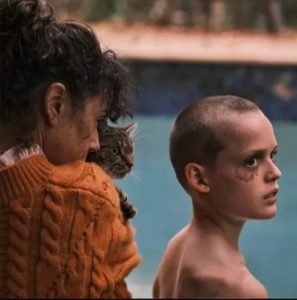Bring Her Back
 As anyone who loves horror films already knows, one of the beauties of the genre is its breadth of styles and subject matter. Any genre that can handily include movies as diverse as The Haunting, Evil Dead II and Martyrs is impressively flexible. An examination of or focus upon death ties all horror together, and a subset of that is grief horror, in which grief is so unbearable for someone that they’ll do anything to remove or change it. Some strong examples of this include Lake Mungo, Anything for Jackson and Don’t Look Now. The Philippou brothers’ sophomore effort (after 2022’s acclaimed Talk to Me), Bring Her Back, is a potent addition to the subset, a brilliantly acted drama that descends into monstrous acts and shockingly grisly violence.
As anyone who loves horror films already knows, one of the beauties of the genre is its breadth of styles and subject matter. Any genre that can handily include movies as diverse as The Haunting, Evil Dead II and Martyrs is impressively flexible. An examination of or focus upon death ties all horror together, and a subset of that is grief horror, in which grief is so unbearable for someone that they’ll do anything to remove or change it. Some strong examples of this include Lake Mungo, Anything for Jackson and Don’t Look Now. The Philippou brothers’ sophomore effort (after 2022’s acclaimed Talk to Me), Bring Her Back, is a potent addition to the subset, a brilliantly acted drama that descends into monstrous acts and shockingly grisly violence.
When Piper (Sora Wong) and Andy’s (Billy Barratt) father dies from an accident, they’re put into a foster home in the care of Laura (Sally Hawkins). Andy is very protective of his sister, who is vision-impaired, and he gets a bad feeling about Laura immediately. Laura presents herself as very caring, but she’s also still getting over the relatively recent loss of her daughter, Cathy, who was also blind and drowned in the swimming pool. Andy also doesn’t trust Laura’s other foster child, the mute Oliver (Jonah Wren Phillips), who mostly is locked in his room, staring fixedly ahead. As time moves on and things become stranger, Andy realizes that he and Piper are both in terrible danger.
 Barratt is terrific as the well-intentioned Andy, trying to take care of Piper but not legally an adult yet, and trying to seem confident but beset by doubt. Andy is way out of his depth, and Barratt plays the character’s confusion and alarm well as the situation deteriorates. Wong is sympathetic and credible as the trusting Piper, and Phillips is eerily perfect as Oliver, who portrays an indelible combination of pitiful and menacing. Hawkins delivers an amazing, layered portrayal as Laura, a woman permanently transformed by grief into something partly heartbreaking but mostly chilling. It’s one of the best performances I’ve seen in horror cinema in many years.
Barratt is terrific as the well-intentioned Andy, trying to take care of Piper but not legally an adult yet, and trying to seem confident but beset by doubt. Andy is way out of his depth, and Barratt plays the character’s confusion and alarm well as the situation deteriorates. Wong is sympathetic and credible as the trusting Piper, and Phillips is eerily perfect as Oliver, who portrays an indelible combination of pitiful and menacing. Hawkins delivers an amazing, layered portrayal as Laura, a woman permanently transformed by grief into something partly heartbreaking but mostly chilling. It’s one of the best performances I’ve seen in horror cinema in many years.
The direction in Talk to Me was bursting with youthful energy, which fit the film’s story. The Philippou’s direction in Bring Her Back is completely different and impressive in a different way: it’s measured, more about performance and atmosphere, more mature. Aaron McLiskey’s cinematography is deliberately muted and rainy and dark (kudos to the POV shots from Piper’s POV), like a slow smothering of hope. Some may find the film’s pace to be too leisurely, but I enjoy a good slow-burn fright flick, and when this one explodes in the final third, it’s jolting and disturbing in the best way. The violence in this movie is so visceral that it’s hard to look at, but it just adds to the power of the film.
This kind of horror movie is not going to be to all horror fans’ tastes, but for those who like Hereditary or Longlegs, Bring Her Back is strong, scary stuff, delivered with style and skill.


 Terry Morgan has been writing professionally since 1990 for publications such as L.A Weekly, Backstage West and Variety, among others. His love of horror cinema knows no bounds, though some have suggested that a few bounds might not be a bad thing.
Terry Morgan has been writing professionally since 1990 for publications such as L.A Weekly, Backstage West and Variety, among others. His love of horror cinema knows no bounds, though some have suggested that a few bounds might not be a bad thing.